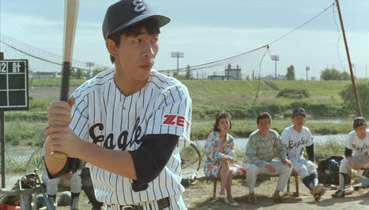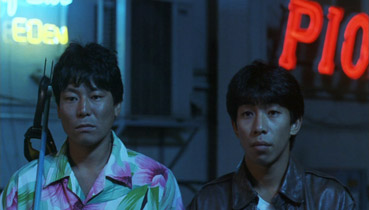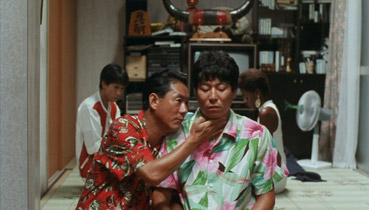|
Kitano Takeshi's second film as director opens, like its predecessor Violent Cop, on a facial close-up. This time, however, it's not to set up a minor character but to introduce the lead, a quiet teenager whose name we won't learn for another 40 minutes, and even then it seems likely he's feeding us a line. This first silent encounter takes place in an unlit cabin toilet a couple of hundred metres from a local baseball field. A seemingly inconsequential image, it's actually a hugely significant moment for reasons that won't become apparent until the end of the film, which makes it damned difficult to talk about why without spoiling things for newcomers. I will get to it – it poses too many questions be ignored – but the discussion will come with a warning so that first-timers can bypass it until they're properly primed by the film itself.
The boy in the toilet is Masaki, who later identifies himself as James, a thoroughly un-Japanese name that he reveals with the sort of giggle that suggests neither we nor the girl he's talking to are meant to take him that seriously. He's the weakest player on the local junior baseball team, a pinch-hitter who is struck out every time he steps up to the plate. If that sentence made little sense then there's a good chance you're neither American nor Japanese and know little about baseball (I certainly had to look one bit up). It's doubtless this that prompted the international title change from 3-4 x jūgatsu (literally '3-4 x October'), a reference to an end-of-film baseball score and the month in which the best games are played, something that was certainly lost on me and would make little sense to a baseball illiterate international audience. Boiling Point may seem less obscure, but its no more suggestive of developments to come than its numerical predecessor.

Anyway, back to the story. Masaki works in a garage that one day is visited by a cocky young yakuza, who expresses his dissatisfaction at the service being offered by humiliating Masaki and smacking him in the mouth, something Masaki responds to by taking a swing back. This lands Masaki and his employer in the bad books of local yakuza boss Otomo, whose representative is nonetheless impressed enough with Masaki's nerve to suggest that he join them, an offer he doesn't respond to either way. As it turns out, the baseball team's manager and local bar owner Iguchi is an ex-Otomo yakuza himself and is persuaded by his girlfriend Miki to help Masaki make peace with the gang. However, when one of the yakuza mocks Iguchi's retired status, Iguchi beats him senseless, which later results in him taking a retaliatory pasting from the man's colleagues. When Iguchi announces his intention to travel to Okinawa to buy a gun, Masaki offers to go in his place, but once there he and friend Kazuo are befriended by a semi-psychotic yakuza bully named Uehara and soon find their own safety under threat.
Important though the plot is, much of the screen time is devoted to character scenes, with narrative advancement occurring in the blink of an edit, a moment of conflict, or a seemingly throwaway line of dialogue. In typical Kitano fashion, there are a number of sequences that appear to have been included primarily for the fun of staging them. A couple will probably need an appreciation of baseball to justify their length and leisurely pace, while others are clearly designed to drive home just how unpleasant a creature Uehara is and how deserving his punishment will be when it eventually arrives.
Stylistically and tonally, the film sees Kitano fine-tuning the elements and techniques first explored in Violent Cop and in the process drawing up a partial blueprint for films to follow. Reaction shots are often static and motionless, violence can strike anyone and explode out of nowhere, and it's here that Kitano's signature before/after editing technique is first used for comic effect, when the cocksure new owner of a high powered motorbike scorns the idea of a helmet and tears off on the machine, and we cut immediately to his shocked and bloody face following his inevitable collision with another vehicle. There's even a beach baseball scene that directly prefigures the seaside game-playing of Sonatine, one whose almost invisible switch from slow-motion to real time would be repeated in a memorable narrative sidestep in Kikujiro.

Intermittently there's a blackly comic edge to the violence, as with the car packed with jeering youngsters that ploughs unexpectedly into a parked vehicle (a stunt done for real with the actors on board), the machine gun hidden in flowers that accidentally discharges and startles everyone in the room, including the person holding it (Kitano's bemused expression here is priceless), and the yakuza soldiers whose open contempt earns them a bottle over the head from Uehara and a thumping from sidekick Tamagi that he only briefly pauses his dancing to administer, a two-pronged assault whose amusement comes from its immediate repetition. There's even a light-hearted sequence in which the boys calmly smuggle automatic weapons onto an commercial flight, a scene almost guaranteed to widen eyes in disbelief in the post 9/11 world. Notably less comical is an earlier bar-room assault in which Iguchi politely tolerates the scornful mocking of a group of youngsters before viciously braining one of them with a glass ashtray. Any satisfaction at seeing spoilt brats put in their place is tempered by the fact that the victim is a young girl rather than a hard-nosed gangster.
While the pace remains characteristically even throughout, the film differs from other early Kitano features in the considerable tonal shift that takes place once Uehara joins the story. Played by Kitano himself in a rare supporting role, Uehara is far and away the most unredeemingly unpleasant and unlikeable character he has portrayed in his own films, a demented and amoral bully on a warped power kick who misses no opportunity to hurt or humiliate others. His first screen appearance sees him being quietly balled out by the yakuza hierarchy on charges of embezzlement, which he responds to by grabbing a bottle to attack his accusers and is only prevented from doing by the physical restraint of those around him. A short while later he's outside the venue, repeatedly kicking the bodywork of a gang car like a petulant teenager until the inevitable fight breaks out between him and its owners. The degree of abuse suffered by the loyal but long-suffering Tamagi – from having his finger cut off as an offering to the yakuza bosses (a sequence that should have all but the insensitive sucking air through their teeth, despite its non-graphic nature) to being sexually assaulted – makes you wonder just what the source of that loyalty is. Twice Uehara lecherously comes on to the terrified Kazuo (sticking his face in the boy's crotch, he flashes him a wide grin and tells him he smells nice, then kisses him on the cheek) and manufactures a reason to get mad at girlfriend Fumiyo when he orders her to have sex with Tamagi, then spends the next few hours repeatedly slapping and kicking her to the point where there will be few watching who don't want to take a swing at him themselves.

Until the final scene, Masaki plays a largely passive role in his own adventure, a position often forced by circumstance. A boy of few words at the best of times – nods and affirmative grunts often stand in for vocal responses – his silence in Uehara's company is clearly the result of youthful fear (an easy one to understand and share, as it happens), while his lack of communication on the baseball field stems at least partly from his embarrassment at his own ineptitude and the derision it provokes in others. Even his one moment of baseball glory is ruined by his disassociation from the world around him, a game-winning home run disallowed because he overtakes his irate team-mate.
Which brings me to the bit that you really shouldn't read unless you've either never seen the film or have absolutely no plans to do so (and if so, why on earth not?). The following paragraph is all about how the film ends, so seriously, if you've not seen the film then skip to the final paragraph and come back here afterwards with you're own opinion about what it all means. Of course if you know the film then you'll probably already have your own views on this – I'm covering it in purely the in the interest of throwing a few possible interpretations into the pot for consideration. Feel free to suggest your own.
Quite simply, the film ends as it begins, with Masaki in the dark shack of the baseball field toilet, from which he casually emerges to return to the game. As an ending it's inconclusively suggestive and open to a number of possible interpretations, particularly in light of the scenes that immediately precede it. The most straightforward is that following his adventures, Masaki has returned to normal life and will deal with the consequences when they eventually arrive. Frankly, this seems unlikely, requiring us to swallow the idea that our boy did not die in the fireball he unleashes on the Otomo company, but that he somehow jumped free before the lorry he was driving hit the building. Sorry, no sale. The second possibility is that the whole thing is a flash-fowards to future events, one that then returns us to the story's beginning, where the central protagonist emerges from the toilet with little idea of the dramatic direction his life is soon to take. The third and most potentially contentious is that the whole thing has been a daydream, concocted in the dark of the toilet by an unassuming nobody who dreams of adventures beyond his experience and capabilities. This is given some credence by Masaki's in-story adoption of an obviously false name, his expressionless observation of events that happen largely around rather than to him, a self-sacrificing final heroic truck drive with the girl at his side, and the fact that Uehara's worst behaviour is directed at everyone else. A pointer to this explanation is provided in the film's opening scene, when Iguchi asks Masaki why he spends so long in the toilet – daydreams this detailed, after all, take time to formulate. If this works for you – and it's certainly my favourite – then it seems likely that the daydream was constructed from actual memories, perhaps sparked by a genuine dressing down received from a cocky garage customer that Masaki wanted to hit but didn't have the nerve to, the rest drawn from stories told by others, and casual friendships that could have been something more.

I'm always surprised when Kitano fans claim to be disappointed by Boiling Point, regarding it as ragged, unfocussed and even a little confusing. It's a view I've never shared nor really understood, as for me much of what makes this film so fascinating and endlessly rewatchable lies specifically in its structural untidiness, if that's even the right term. Boiling Point is all about Takeshi exploring and shaping his directorial identity, experimenting with storytelling, with scene construction and with character definition and interaction, in the process fine tuning elements that would come to define the Kitano cinematic style. It's littered with offbeat characters and encounters that don't always tidily connect with each other but are enjoyable in themselves, from the train passenger who asks Masaki and his girlfriend directly about their sex life then persuades them to go fishing with him, to a varied cast that includes an American army gun-runner and a black female hostess, an extremely rare character to find in Japanese cinema of any period. In this respect it could be argued that Boiling Point plays more like a painstakingly detailed sketch book than a completed painting, but it's one littered with exciting and imaginative artwork in which the foundations for future masterpieces have been most vividly drawn.
As with Second Sight's release of Violent Cop, the transfer on Boiling Point is an NTSC to PAL conversion. Fortunately it's a good one, with better sharpness and more consistently solid contrast than its predecessor, while there is simply not enough fast movement in the film itself to cause any major motion glitches.
There's a choice between Dolby 2.0 mono and 5.1 surround tracks, but the 5.1 is no new remix but an AC3 reprocessing of the mono track, presumably with the settings on auto. Thus while the mono track sounds consistently good, the 5.1 is subject to some odd shifts of quality, with dialogue in some scenes (those in which Uehara is in verbal conflict with the yakuza hierarchy are typical) sounding distant and indistinct. The mono track is also louder, and some of the more subtle background effects can't be heard at all on the 5.1. Go with mono.
Nothing here, unfortunately.
Despite what some may claim, this is one of Kitano's most fascinating early works as a filmmaker and a crucial stepping stone in the shaping of his directorial identity. It's littered with delightfully oddball character moments and balances its sometimes startling violence with a sometimes jet-black humour that is both smart and cinematic. Boiling Point is Kitano trying things out and scoring a few genuine bulls-eyes in the process, and deserves recognition as the important early work it is for this remarkable talent. Second Sight's DVD is lacking in extras and has a superfluous 5.1 track, but otherwise looks and sounds rather good.
|